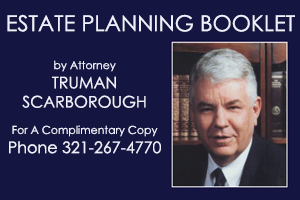Who has to pay the bills when someone dies?
By Attorney Truman Scarborough
No one is obligated to pay a decedent’s debts unless he/she has agreed to be personally responsible. Paying the decedent’s creditors is part of the probate process with beneficiaries of the probate estate bearing the burden as a reduction in the size of their inheritance.
Assets like life insurance policies and IRAs normally name individuals as beneficiaries. They pass outside of probate and avoid the claims of creditors. However, if all named beneficiaries die before the decedent, the asset will have to be probated and become subject to creditors’ claims.
Florida law exempts certain other assets from creditors’ claims even though they are not directly payable to a beneficiary. This includes $20,000 in furniture, furnishings, and appliances, plus two motor vehicles. If the home is going to certain relatives, the probate court can determine that it is “protected homestead” passing free of all claims, except for: mortgages, IRS liens, liens for work on the home, and property taxes.
Two years after the date of death, creditors’ claims are barred and Summary Administration may be used to probate the estate. No Personal Representative (executor) is appointed to administer the estate for the court orders direct distribution to the beneficiaries. This shortened process may also be used within two years of the date of death if the estate is less than $75,000 and there are no known creditors. If within two years of the date of death creditors’ claims arise, the beneficiaries of the Summary Administration are proportionally liable based on their share of the distributions.
When Summary Administration is not an option, Formal Administration is required. All reasonably ascertainable creditors must be mailed a Notice to Creditors advising that they have thirty days to file a claim with the court. The Notice to Creditors is also published in the newspaper and any otherwise unknown creditor has three months from the date of publication to file a claim. If a claim is not filed in time, it is barred. The Personal Representative can object to questionable claims. When an objection is filed, the creditor must initiate a separate lawsuit to enforce the claim.
The probate code also addresses: 1] the order in which different kinds of bequests bear the burden of paying claims (specific bequests are paid first, leaving the residual beneficiaries to pay the creditors and divide what remains), and 2] the order in which different types of claims are paid when there are insufficient assets to pay all the creditors (costs of settling the estate and funeral expenses are high priorities).
The situation is different with a trust. Trust assets must be used to satisfy creditors’ claims if there are insufficient funds in the probate estate. However, a creditor cannot pursue a claim directly against the trust and must go through the probate process. This is a problem for the creditor because the trust, by its very nature, avoids probate. A creditor’s only recourse may be to initiate probate and assume the responsibilities of administering the estate. This can also create a problem for the successor trustee. If the trustee has distributed all the trust assets and a creditor subsequently initiates probate, the trustee could be personally responsible if he is unable to get the beneficiaries to return a portion of their distributions to satisfy the claim.
For further information you may be interested in Attorney Truman Scarborough’s Booklet on Estate Planning in Florida. It is available without charge or obligation by calling (321) 267 – 4770. His office is located at 239 Harrison Street, Titusville, Florida.


Recent Comments